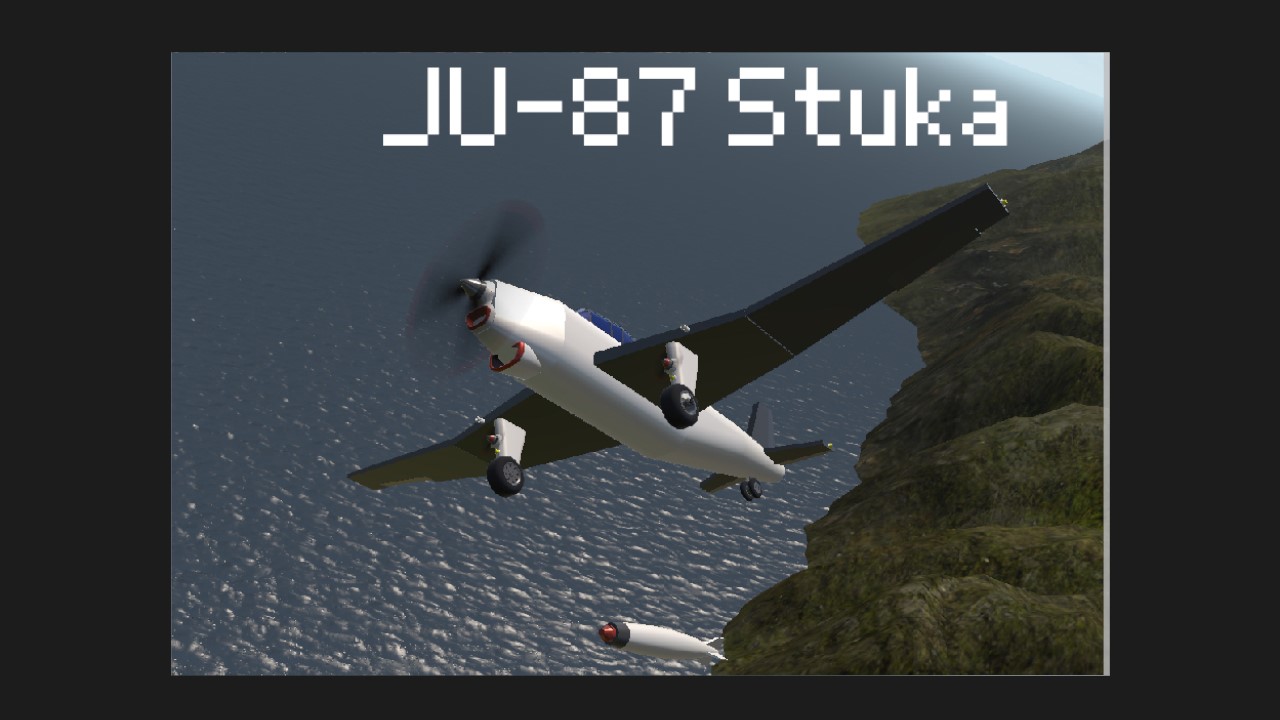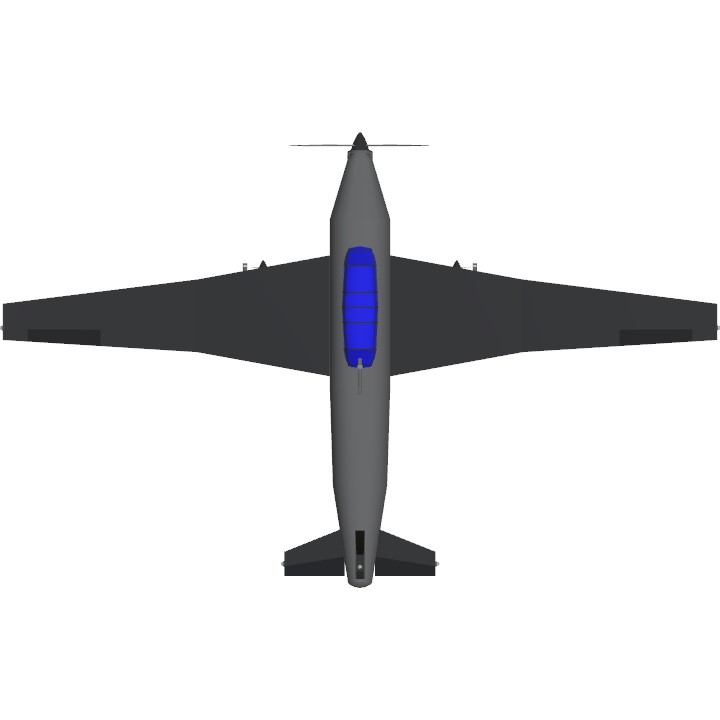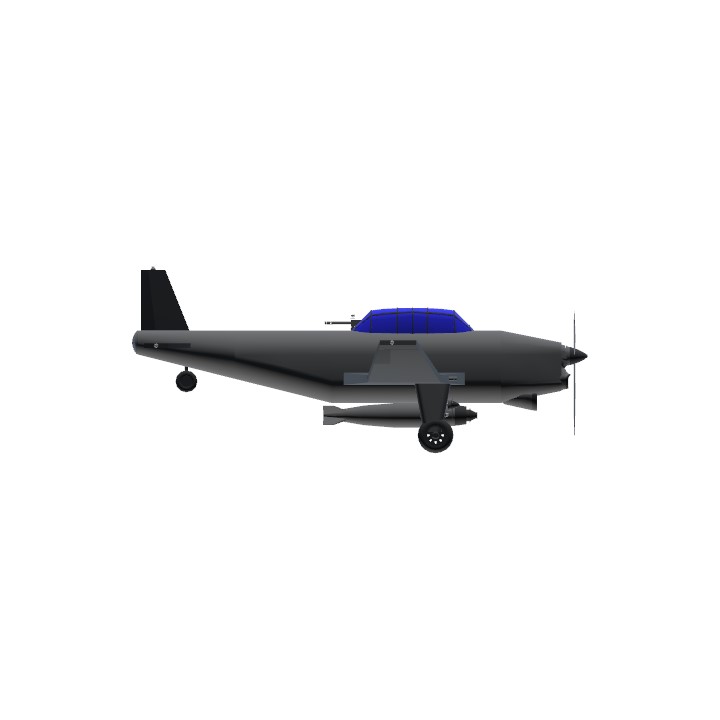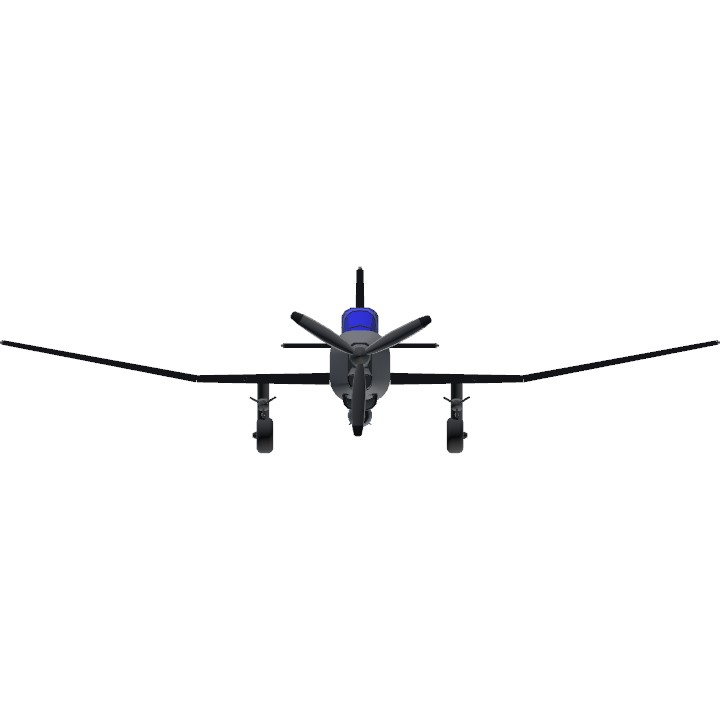Thanks to WritersCrusadersAirCo2 for the turret!
Action Groups:
1: Landing Lights
2: Wing Propellers
3: Nav Lights
4: Auto Aim Gunner
8: Engine
About This Plane:
The Junkers Ju 87, popularly known as the "Stuka",[b] is a German dive bomber and ground-attack aircraft. Designed by Hermann Pohlmann, it first flew in 1935. The Ju 87 made its combat debut in 1937 with the Luftwaffe's Condor Legion during the Spanish Civil War of 1936–1939 and served the Axis in World War II from beginning to end (1939–1945).
The aircraft is easily recognisable by its inverted gull wings and fixed spatted undercarriage. Upon the leading edges of its faired main gear legs were mounted ram-air sirens known as Jericho trumpets, which became a propaganda symbol of German air power and of the so-called Blitzkrieg victories of 1939–1942, as well as providing Stuka pilots with audible feedback as to speed. The Stuka's design included several innovations, including automatic pull-up dive brakes under both wings to ensure that the aircraft recovered from its attack dive even if the pilot blacked out from the high g-forces, or suffered from target fixation.
The Ju 87 operated with considerable success in close air support and anti-shipping roles at the outbreak of World War II. It led air assaults during the Invasion of Poland in September 1939. Stukas proved critical to the rapid conquest of Norway, the Netherlands, Belgium, and France in 1940. Though sturdy, accurate, and very effective against ground targets, the Stuka was, like many other dive bombers of the period, vulnerable to fighter aircraft. During the Battle of Britain of 1940–1941, its lack of manoeuvrability, speed, or defensive armament meant that it required a heavy fighter escort to operate effectively.
After the Battle of Britain, the Luftwaffe deployed Stuka units in the Balkans Campaign, the African and the Mediterranean theatres and in the early stages of the Eastern Front war, where it was used for general ground support, as an effective specialised anti-tank aircraft and in an anti-shipping role. Once the Luftwaffe lost air superiority, the Stuka became an easy target for enemy fighters, but it continued being produced until 1944 for lack of a better replacement. By 1945 ground-attack versions of the Focke-Wulf Fw 190 had largely replaced the Ju 87, but it remained in service until the end of the war in 1945.
Germany built an estimated 6,000 Ju 87s of all versions between 1936 and August 1944.
Oberst Hans-Ulrich Rudel became the most successful Stuka pilot and the most highly decorated German pilot of the war.
Auf Wiedersehen!
(Or Tschüss)
Specifications
General Characteristics
- Predecessor JU-87 Stuka (WIP)
- Created On iOS
- Wingspan 48.8ft (14.9m)
- Length 30.9ft (9.4m)
- Height 12.6ft (3.9m)
- Empty Weight 6,979lbs (3,165kg)
- Loaded Weight 11,944lbs (5,418kg)
Performance
- Horse Power/Weight Ratio 0.254
- Wing Loading 48.3lbs/ft2 (235.9kg/m2)
- Wing Area 247.2ft2 (23.0m2)
- Drag Points 2953
Parts
- Number of Parts 39
- Control Surfaces 5
- Performance Cost 319





@DerAdlerFLUGFAHRT I’m German too, I’ve seen the plane before irl, (The plane of the nose does look ugly) I’ll fix it. But in my opinion the plane looks ugly.
(I meant you haven’t downloaded my plane)
@Firecharge123 I've meant that ur plane looks like, uglier than the stuka is (and the stuka is beautiful, dont offend it), like, look at stuka nose and at yours stuka nose
Bro my nickname is literally screaming "HALLO ICH KOMME AUS DEUTSCHLAND!!!" Dont you think that i haven't seen planes of mine country
@DerAdlerFLUGFAHRT You haven’t seen the plane, & the plane is supposed to be ugly, it’s historically accurate. (It’s not supposed to look good)
I bought a lego knockoff set of this plane like 4 weeks ago
Please, just please, make it look better
Btw my internet was down so I had to wait hours to post this.